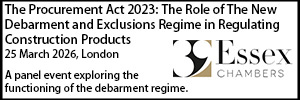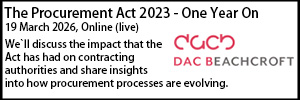Contracting authority succeeds in lifting automatic suspension of entry into contract
- Details
A contracting authority has successfully applied for the lifting of an automatic suspension of entry into a contract, the first case of its kind under new procurement rules.
The case of Indigo Services (UK) Limited v The Colchester Institute Corporation concerned a proposed contract for the provision of cleaning services at the Colchester Institute’s (the College’s) two largest sites, in Colchester and Braintree. The contract was due to last for three years from 1 January 2011, with optional annual extensions until 31 December 2011.
There were five tenderers in the competition and the Institute awarded the contract to Emprise Service. Indigo came third, a considerable way behind the winner.
Indigo launched a legal action on the last day of the standstill period. This meant that – under regulation 47G of the Public Contracts Regulations 2006, as amended by the Public Contracts (Amendment) Regulations 2009 – the prohibition on the College entering into the contract was automatically extended. This new rule came into force in December 2009.
Colchester Institute then applied under regulation 47H(1) for the suspension to be lifted. There was a degree of urgency as a 30-day mobilisation period was required, starting on 3 December, because of the need to transfer the employment contracts of the existing staff to the new contractors under TUPE.
David Donaldson QC, sitting as a Deputy High Court judge, applied the American Cyanamid guidelines.
The judge ruled that:
- There was nothing to support the argument made on Indigo’s behalf that the Regulations provided a steer – “said to be a bias not amounting to a presumption” – in favour of an injunction. Even if there was such a steer, and it was factored in, his judgement would be unaffected
- It would “substantially emasculate” the effect of the regulations if they were interpreted as requiring the claimant challenging the award to establish, as a condition of obtaining any relief, that it would, but for the defects in the procurement process, have been awarded the contract. The claimant instead needs to show that by reason of the defects it has lost, or will absent of a re-run lose, a chance of obtaining the contract, “provided that the chance is more than fanciful”
- Suggested defects in the pre-qualifying stage could not have any causative effect resulting in loss of a chance because Indigo was successful in qualifying
- Applying the Uniplex decision, complaints about the unlawfulness of the Contract Notice were time-barred. Indigo submitted that time could not run until there was a completed cause of action – “that, it argued, required damage, at the least in the form of a lost chance, which did not eventuate until the award decision” – but the judge said this argument was flawed
- There was some substance in most of the complaints which related to the scoring methodology announced in the Invitation to Tender and how it was applied
- There was a serious issue to be tried as to whether Indigo had suffered, or was threatened by, loss of a more than fanciful chance of obtaining the contract
- A claim for damages would not be intrinsically an adequate remedy in this case, and in that regard failure to continue the standstill could properly regarded as a prejudice to Indigo
- The problem with a continuation of the standstill period was not primarily, or even significantly, financial. Instead the College would be forced to close the Colchester site if it was deprived of cleaning services. “Quite apart from the effect on the College itself and its staff, this engages the interests of the students and the wider public interest in the proper and continued provision of further and higher education,” the judge said
- The existing contract was extended for a 21-month period to 31 December 2010. The judge said: “It is in my view clear that the contract provided only for one extension, which could have been – but was not – for a full two years. It does not provide for a further extension”
- Indigo’s submission that an extension, even if not provided for in the contract, does not call for a public procurement process was counter-intuitive and not – as Indigo’s counsel tried to claim – supported by judicial comments in the Pressetext case
- The prejudicial impact on the College far outweighs any prejudice which may be caused to Indigo by lifting it and relegating it to a claim in damages
- Even though Indigo had passed the threshold of a serious issue as regards the cause of action, it would be improbable that a court would grant an injunction at trial. This was for three reasons: the factors relating to comparative prejudice would be effectively the same; more likely than not the court would find in favour of the College on the causation question; and “even if the trial court were to accept Indigo’s case that the defects had caused the loss of a non-fanciful chance,….[it is] most improbable that it would view the chance as significantly in excess of that. Such a conclusion would reduce the attractions of ordering some form of re-run”.
The judge concluded: “The balance of irremediable prejudice points clearly in favour of lifting the standstill so as to permit immediate signature of the contract with Emprise. Even if I had regarded the balance as finer, the limited prospects of an injunction being ordered at trial would have made it inappropriate to do other than terminate the standstill as requested by the College.”
He therefore ordered for the suspension to be lifted.
Colchester Institute was represented by the Cambridge office of Mills & Reeve and by Philip Moser of Monckton Chambers.
Philip Hoult
A contracting authority has successfully applied for the lifting of an automatic suspension of entry into a contract, the first case of its kind under new procurement rules.
The case of Indigo Services (UK) Limited v The Colchester Institute Corporation concerned a proposed contract for the provision of cleaning services at the Colchester Institute’s (the College’s) two largest sites, in Colchester and Braintree. The contract was due to last for three years from 1 January 2011, with optional annual extensions until 31 December 2011.
There were five tenderers in the competition and the Institute awarded the contract to Emprise Service. Indigo came third, a considerable way behind the winner.
Indigo launched a legal action on the last day of the standstill period. This meant that – under regulation 47G of the Public Contracts Regulations 2006, as amended by the Public Contracts (Amendment) Regulations 2009 – the prohibition on the College entering into the contract was automatically extended. This new rule came into force in December 2009.
Colchester Institute then applied under regulation 47H(1) for the suspension to be lifted. There was a degree of urgency as a 30-day mobilisation period was required, starting on 3 December, because of the need to transfer the employment contracts of the existing staff to the new contractors under TUPE.
David Donaldson QC, sitting as a Deputy High Court judge, applied the American Cyanamid guidelines.
The judge ruled that:
- There was nothing to support the argument made on Indigo’s behalf that the Regulations provided a steer – “said to be a bias not amounting to a presumption” – in favour of an injunction. Even if there was such a steer, and it was factored in, his judgement would be unaffected
- It would “substantially emasculate” the effect of the regulations if they were interpreted as requiring the claimant challenging the award to establish, as a condition of obtaining any relief, that it would, but for the defects in the procurement process, have been awarded the contract. The claimant instead needs to show that by reason of the defects it has lost, or will absent of a re-run lose, a chance of obtaining the contract, “provided that the chance is more than fanciful”
- Suggested defects in the pre-qualifying stage could not have any causative effect resulting in loss of a chance because Indigo was successful in qualifying
- Applying the Uniplex decision, complaints about the unlawfulness of the Contract Notice were time-barred. Indigo submitted that time could not run until there was a completed cause of action – “that, it argued, required damage, at the least in the form of a lost chance, which did not eventuate until the award decision” – but the judge said this argument was flawed
- There was some substance in most of the complaints which related to the scoring methodology announced in the Invitation to Tender and how it was applied
- There was a serious issue to be tried as to whether Indigo had suffered, or was threatened by, loss of a more than fanciful chance of obtaining the contract
- A claim for damages would not be intrinsically an adequate remedy in this case, and in that regard failure to continue the standstill could properly regarded as a prejudice to Indigo
- The problem with a continuation of the standstill period was not primarily, or even significantly, financial. Instead the College would be forced to close the Colchester site if it was deprived of cleaning services. “Quite apart from the effect on the College itself and its staff, this engages the interests of the students and the wider public interest in the proper and continued provision of further and higher education,” the judge said
- The existing contract was extended for a 21-month period to 31 December 2010. The judge said: “It is in my view clear that the contract provided only for one extension, which could have been – but was not – for a full two years. It does not provide for a further extension”
- Indigo’s submission that an extension, even if not provided for in the contract, does not call for a public procurement process was counter-intuitive and not – as Indigo’s counsel tried to claim – supported by judicial comments in the Pressetext case
- The prejudicial impact on the College far outweighs any prejudice which may be caused to Indigo by lifting it and relegating it to a claim in damages
- Even though Indigo had passed the threshold of a serious issue as regards the cause of action, it would be improbable that a court would grant an injunction at trial. This was for three reasons: the factors relating to comparative prejudice would be effectively the same; more likely than not the court would find in favour of the College on the causation question; and “even if the trial court were to accept Indigo’s case that the defects had caused the loss of a non-fanciful chance,….[it is] most improbable that it would view the chance as significantly in excess of that. Such a conclusion would reduce the attractions of ordering some form of re-run”.
The judge concluded: “The balance of irremediable prejudice points clearly in favour of lifting the standstill so as to permit immediate signature of the contract with Emprise. Even if I had regarded the balance as finer, the limited prospects of an injunction being ordered at trial would have made it inappropriate to do other than terminate the standstill as requested by the College.”
He therefore ordered for the suspension to be lifted.
Colchester Institute was represented by the Cambridge office of Mills & Reeve and by Philip Moser of Monckton Chambers.
Philip Hoult
Sponsored articles
Walker Morris supports Tower Hamlets Council in first known Remediation Contribution Order application issued by local authority
Unlocking legal talent
Legal Director - Government and Public Sector
Commercial Lawyer
Locums
Poll
15-07-2026 11:00 am

















































